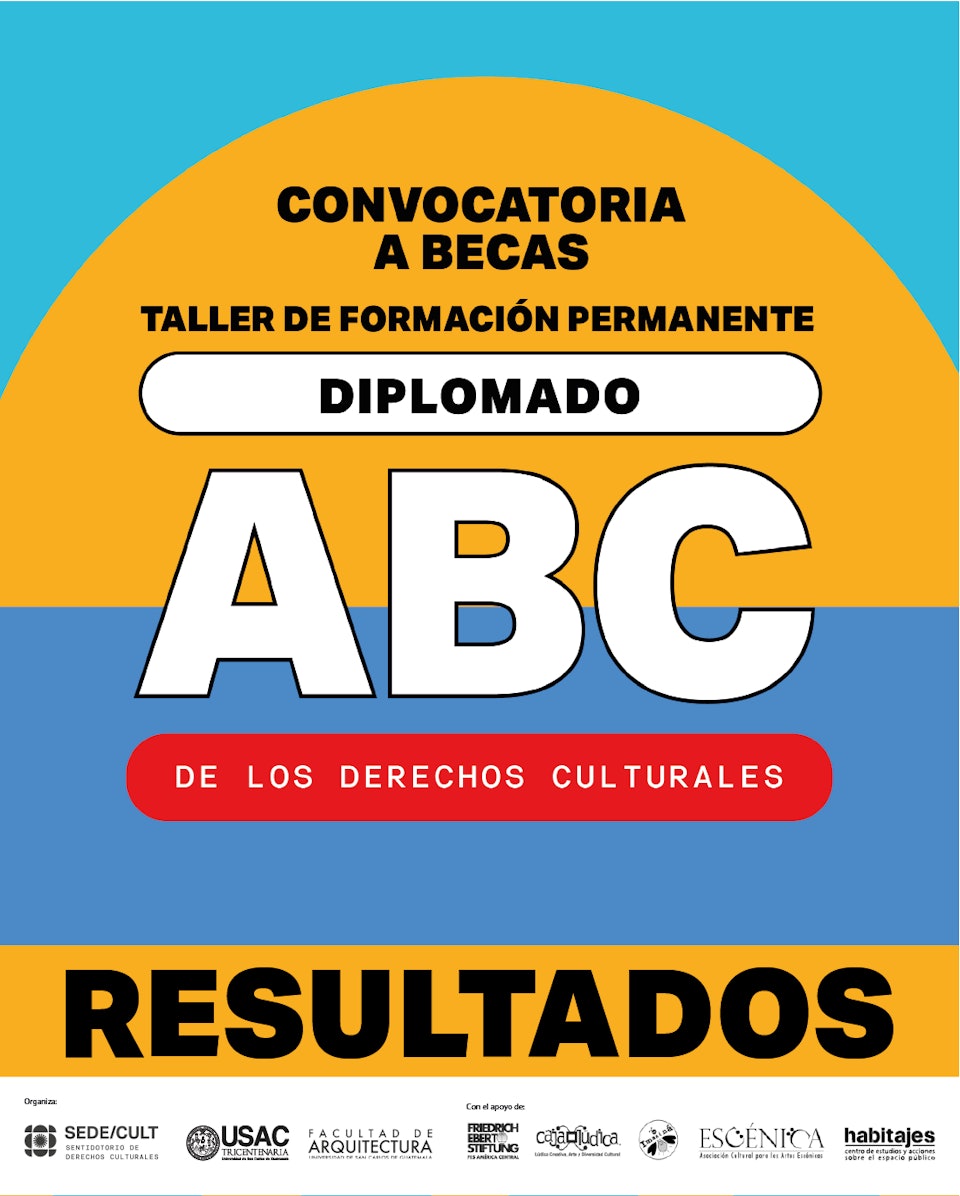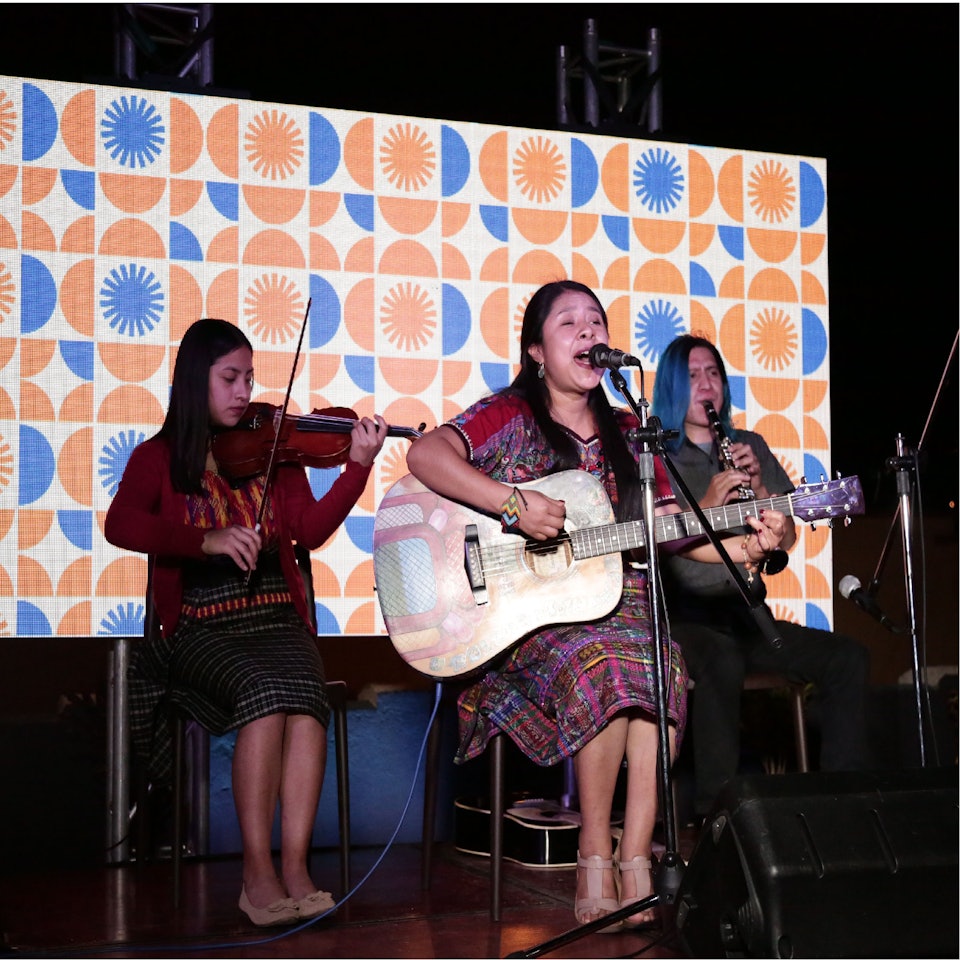Featured Organization
SEDE/CULT
Central America

Consulte este perfil en español aquí.
Sentidotorio de Derechos Culturales (SEDE/CULT) is a digital sociocultural center, which the organization describes as being “delocalized within Maya, Xinka, and Garifuna territory, in an area also recognized as being part of the nation-state of Guatemala.”* While the online space launched in 2021 with the release of the SEDE/CULT website, the idea and formulation of the Sentidotorio began in 2018. In conversation with ARC, the sociologist, artist, and cultural practitioner who coordinates the Sentidotorio, André de Paz explained how SEDE/CULT came to be. At the time, de Paz worked at the Ministry of Culture in Guatemala; the idea subsequently arose from lessons learned in the public sector, networking with various community-based cultural organizations and through other cultural experiences.
A term coined by the SEDE/CULT team, the Sentidotorio (“Senti” from the Spanish verb “sentir,” to feel) is inspired by the model of citizen observatories and is the first citizen observatory on cultural rights in Guatemala. In contrast to the model it draws inspiration from, the center breaks down the academic veneer of an “objective” and detached observatory to promote empathy with and democratization of cultural rights. In forming the center, André de Paz underscored how the team wanted to conceptualize the plurality of ways we experience and interact with culture. “We cannot only observe cultural rights, we also have to feel them throughout our body, honoring the nature of culture itself. This is where the word ‘sentidotorio’ came from.”

To achieve a holistic understanding of cultural rights, SEDE/CULT creates support networks, compiles disparate sources of knowledge, and facilitates discussion throughout the cultural sector. The myriad of initiatives and campaigns the center undertakes are rooted in three main actions: “INvestigación, INformación, INeducación” (research, information, and (in)education). These pillars of the Sentidotorio’s work revolve around the ever-present need to take a transdisciplinary approach to studying cultural rights. As André explained “The “I-N” is a methodology that we put into practice in all of our processes, that is a provocation to action.” The initial step of this provocation resides in SEDE/CULT’s educational workshop and course on the “ABCs” of cultural rights. “The first thing we said was that we would create a first level [where] you have a common language of ‘how I can understand cultural rights in my context’ with the diversity [of understandings] we have.”
@sedecultgt RAP / Derechos Culturales #DerechosCulturales #CulturalRights #DerechosHumanos #hiphop #viral @rebecalane6 ♬ Nuestra Canción - Monsieur Periné

The center has launched over five campaigns across its numerous social media accounts and its website to diffuse information on different conceptualizations of culture and cultural rights. “We put questioning, dialogue, at the center. That’s the key.”
Other actions put forward by SEDE/CULT revolve around its Manifesto for Cultural Rights in Iximulew/Guatemala. In the document, among other tenets, SEDE/CULT affirms that “violations of cultural rights provoke tensions and conflicts of identity.” These tensions serve as “some of the leading causes in acts of violence, war, and terrorism, reflected in historical, psychosocial, and intergenerational traumas still felt in present-day Guatemala.” Similarly, the manifesto posits the need for clarification of the place cultural rights occupy within the larger human rights framework and the need to reflect on the importance of “spaces, actions, and cultural and artistic thoughts.”

Additionally, the center certifies safe spaces for cultural rights. Currently on their website they recognize 30+ certified organizations, spaces, individuals, businesses, and projects. These spaces commit to cooperation in cultural rights and legitimize dialogue, respect, and the full exercise of cultural identities and heritages.
Another way SEDE/CULT empowers stakeholders is through their column “Vértebra Cultural ‘la columna.’” Contributors to the column are encouraged to become mediators of cultural rights by selecting related legislation, treaties, or policy and reflecting on them through creative free writing and analysis. By questioning these texts, writers' pieces help build a diverse compilation of insights concerning how the codification of culture shapes the reality and exercising of such rights.
For example, in a recent article for the column, ARC’s Latin America Regional Representative Alessandro Zagato describes the role of artists as cultural defenders. Deriving insights from his firsthand experience and work as part of ARC, Zagato notes the power of art and artists to resignify culture—promoting social transformation and fomenting greater respect for human rights.
With other articles covering feminist journalistic practice in the Guatemalan context, cultural dynamics in urban development, and design and the culture of sustainable development in Guatemala, the column serves as a space to discuss the convergence and conceptualization of cultural rights through distinct individual and collective lenses. The organization also compiles a diverse wealth of knowledge through its online database SENTIDO/TECA, featuring a wide range of documents on the protection and promotion of cultural rights.
As a constantly growing and evolving center in its own right, SEDE/CULT has also documented the work of partner institutions through interviews to highlight their work supporting cultural rights in their communities.
Through developing and refining SEDE/CULT’s work, a key reflection gleaned was that “the most important lesson that we continue to reaffirm is that we, [as a society] keep ignoring the integral dimension of culture […] That’s why we feel that dialogue and positioning of the topic continue to be key.” The center's impact also extends far beyond its direct initiatives. By facilitating connections, community, and conversation, the center engages individuals to learn about cultural rights and discuss them in their communities. “It is necessary to set small triggers to awaken others. It is also a learning experience for us that comes from [an idea of culture that] is analog[ous] of ‘cultural acupuncture.’ [...By engaging] cultural points, it’s like acupuncture touching a neurological point that activates different dimensions.”
Activating these cultural touchstones is a common theme of the Sentidotorio, and it positions itself as a bridge between public and private cultural sectors. To do this, they hope to continue fostering dialogue and fomenting collaboration. “The future remains for us to be a space of support, of feeling, to strengthen processes and projects [on cultural rights].” Referencing the unique historical and sociocultural context of systemic violence in Guatemala, André made clear the need to continue raising their voices and making noise about cultural and human rights. “Violence generates fear, and fear generates silence. Silence is the opposite of cultural diversity.”
By Jake Neuberger, April 2023. Jake graduated from the George Washington University, majoring in Political Science and International Affairs with minors in Spanish and Sociocultural Anthropology. He is a Program Assistant for Latin America and the Caribbean at the Artists at Risk Connection (ARC).
*Information quoted from the SEDE/CULT website, along with ARC's interview with André de Paz were originally in Spanish. ARC provided the English translations for all quotes.